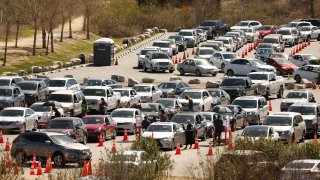
What to Know
- The U.S. is "nowhere close" to achieving herd immunity from COVID-19, a CDC scientist said Friday.
- The proliferation of new, more contagious virus strains requires a higher proportion of the population to get vaccinated.
- The outbreak could get worse as immunity decreases over time among vaccinated individuals or those who have recovered from COVID-19.
The U.S. is "nowhere close" to achieving herd immunity from COVID-19, and more transmissible variants mean even more people will need to get vaccinated to reach it, a CDC scientist said Friday.
Herd immunity occurs when enough people in a given community have antibodies against a specific disease, either through vaccination or prior exposure to the virus. That makes it difficult to spread from person to person and even protects people who don't have any immunity.
"Currently we know that the majority of the U.S. population is not immune to SARS-CoV-2 and variants may cause this portion of the population that is not immune to increase," said Adam MacNeil, an epidemiologist at the Centers for Disease Control and Prevention.
Get Tri-state area news delivered to your inbox. Sign up for NBC New York's News Headlines newsletter.
To reach the threshold of herd immunity while battling new, more contagious virus strains, a higher proportion of the population needs to get vaccinated, MacNeil said at a Food and Drug Administration meeting reviewing Johnson & Johnson's application to authorize its COVID-19 vaccine for emergency use.
Scientists don't believe immunity lasts forever. It weakens over time, and that could exacerbate the outbreak as previously protected people become vulnerable to infection, MacNeil said.
His comments come a week after a Wall Street Journal opinion piece claimed the U.S. will achieve herd immunity by April.
Money Report
While virus variants have shown to decrease the effectiveness of a COVID vaccine to protect against infection, vaccines have proven effective at preventing severe disease and hospitalization against the more infectious strains.
Scaled-up vaccination would substantially slow down the current trajectory of a highly contagious COVID variant that was first identified in the U.K. from becoming the dominant virus strain in the U.S. by March, MacNeil said.
He said increased vaccination will be critical for the country to catch up to the benchmark.
"Vaccination has started and hopefully this is moving us closer to filling the herd immunity gap."






